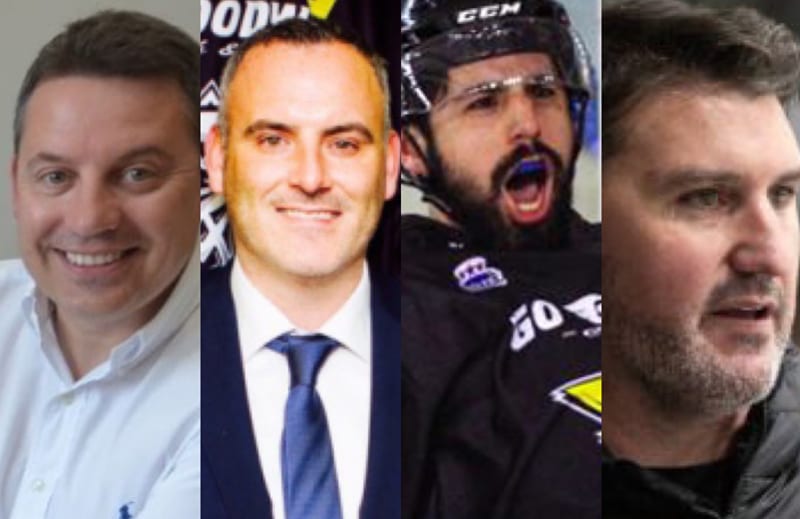
It’s hard to believe it’s been five years since a once prominent name in British ice hockey returned, but it’s been quite a story in their relatively short history.
Manchester Storm returned to the top flight of the sport after originally going out of business in 2003, replacing a Hull Stingrays team, who themselves fell into financial difficulty and dropped out of the Elite League.
The team based in Altrincham have built up a devoted fanbase as they compete with their EIHL contemporaries and have enjoyed a magnificent few years back in the limelight.
Their return was somewhat sudden when their comeback was announced on 24th June 2015. So much so that very little had gone into laying the foundations in terms of season tickets or even a team.
Now, five years to the day when they took on Cardiff Devils in their first competitive game in Elite League competition, where they lost 5-1, some of the figures involved with the club have looked back on those early days and the challenges they had in bringing it all together.
In fact, prior to the announcement of their return, they had just 10 DAYS to get their house in order, as former director Mark Johnson explained, before the breaking story that changed ice hockey in Manchester.
“There had been an ending of the contract with Manchester Phoenix and at the time, we weren’t 100% sure what we were going to do about senior hockey in Altrincham,” Johnson said.
“Originally, we were going to go with Altrincham Aces and support them through the junior development which all changed when the Phoenix were no longer.
“We were then contacted by Tony Smith, the Elite League chairman, to tell us there had been some trouble with Hull Stingrays and that they would be looking for a tenth team to join.
“If Hull couldn’t continue, he asked if would we be interested in that slot?
Manchester Storm announce their return to the world
The Manchester Storm are back: http://t.co/nmvKGaqZjK #thereisastormcoming
— Manchester Storm | #TakeShelter (@Mcr_Storm) June 24, 2015
“Prior to the announcement, very little work had gone in, to be honest. As a company, we’d been founder members of the Elite League when it started as we had Basingstoke Bison in there so we were familiar with the people involved.
“As for putting everything together, it was miracle stuff. It’s something I’d never wish to do again to be honest.
“After Tony called, I attended an Elite League meeting and laid out our thoughts, what kind of team we would have, budgets and all the things they required.
“We were accepted and all in, it took about 10 days and the other nine teams were all supportive and helpful as we got ourselves together.
“We had people helping us with ITC cards, the necessary documents, visas and work permits, where Sheffield Steelers were tremendously helpful with us, so it was literally 10 days of a timeline and hitting the ground running.
“In fact, I was meant to be on a two week cruise and I spent the two weeks literally resurrecting Manchester Storm and getting them into the Elite League. There was no preamble. It was set up as it went out.”
Storm’s re-emergence came as Manchester Phoenix and Silverblades, who owned the Altrincham rink parted ways, forcing Phoenix to play elsewhere for two years until they folded in 2017.
So much had to be done to get them ready for the new season and time was of the essence as Storm put their structure in place.
They needed a general manager to oversee the day to day running of the club and they turned to Neil Russell, a man with a pharmaceutical sales background, but a deep passion for ice hockey and his team, Belfast Giants and was part of their media output for some time.
As he explains, he found that he had gained a lot of respect from various figures within the game who had helped put him forward for the new role with the Storm.
“It was very random how it all happened,” he recalled. “I was driving around Belfast in early June and it was initially Paul Thompson then Todd Kelman telling me Manchester Storm were coming back and joining the Elite League.
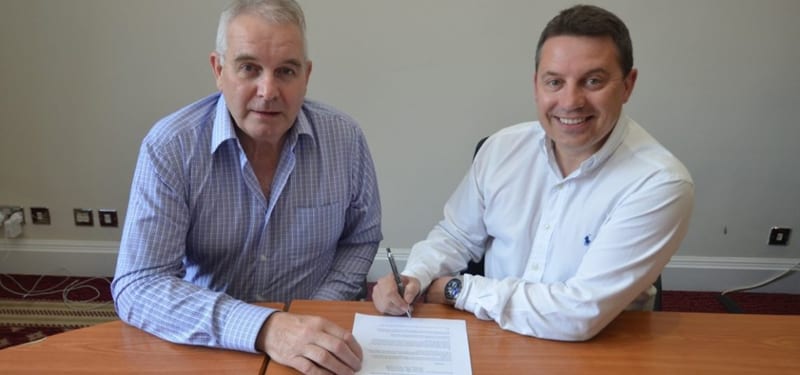
Elite League chairman Tony Smith with Mark Johnson as Manchester Storm were brought into the Elite League (PHOTO: Elite Ice Hockey League)
“They told me Mark Johnson and Mike Petrious were looking for a new general manager and had put my name forward for it. Mark picked up the phone a few hours later, then 48 hours later, I was on a flight to Birmingham to meet Mike, which went really well.
“Six weeks later, I was packing my bags and making the move across the Irish Sea. It really was a whirlwind, where decisions had to be made very quickly. Family considerations, of course, leaving Belfast and the thought of moving to Manchester for a new adventure.
“It was exciting, but with some trepidation as well. Ice hockey – and Belfast Giants – has been a passion of mine for a long, long time. The decision wasn’t taken lightly, but I have no regrets about it.
“I had a semblance of what was to be done, but when you got on the ground and you’re seeing pre-season games dropping in, players needing signed, no houses, no insurances, no car deals, visas, ITCs, season tickets, merchandise – all those things hadn’t been touched.
“I look back and continue to be grateful to Wes Goodwin and his family, from Go Goodwins, who were massive for us.
“Getting a major sponsor in like them took the pressure off and the travel element of going to away games saved us a significant sum of money in those first couple of years.”
The next step was bringing in a coach and one obvious name was Omar Pacha, who had just led Hull Stingrays to the play-off weekend in what turned out to be their final campaign.
But was there anyone else in the frame for the job?
“When it came to a coach, it was actually Bobby McEwan who called me about Omar,” Johnson continued. “I’ve known Bobby for years and he couldn’t speak any higher of him and there was also players who would be available because of Hull’s predicament.
“Omar had been their coach so the angle was if we get him in, it may be quicker in getting a team on the ice than going through a lengthy interview process of looking at potential coaches like a Paul Adey or someone like that.
Manchester took on Nottingham Panthers in a pre-season affair
“Omar was the fit because of the glowing report Bobby gave him and there was a team almost ready to go.”
Russell added: “When I first met Omar, he flew in from Montreal and we went to the rink. He was heavily jet lagged and was a grumpy so and so. We were stuck in a horrible dingy office and I remember thinking about how important it was for us to get along and work together.
“I needed someone who was fully invested in what we were trying to do and achieve and I remember thinking on that first day, I’ll give you that first day because of the jet lag.
“From that point on, we clicked and we’re still good mates to this day. We speak every day, even now and we worked so closely together and he’ll be the first to tell you in that first season, there were points, as a coach, where I felt he needed to improve, but I had to remember he had the toughest job.
“I really challenged him at the end of that first season and had to tell him he had to be one of the fittest guys on the ice. We couldn’t afford a full time bench coach and I really tasked him with different things going into the second season. I really feel he elevated and grew as a person, but as a human being and a professional.
“Look where he is now, doing a great job in Dundee and I think he’s taken a lot of what he learned in Manchester about that community vibe, working with the fan base and I’m actually proud of what he’s achieved.”
For Omar, it was a strange situation for him. His first season as a coach with Hull after replacing Sylvain Cloutier saw him take the Stingrays all the way to the play-off finals weekend. They were four seconds away from the final in fact, as Mathieu Roy sunk them with a powerplay winner for Sheffield in their semi final 3-2 defeat.
Suddenly he found himself without a club as Stingrays left the league, but his good working relationship with McEwan led to him taking over at Storm. As he soon found out, the set-up was going to be much different compared to what he had experienced previously.
Pacha said: “There was a lot going on in the background, as they were trying to bring Neil Russell in as the GM, which I didn’t know about initially. But the confirmation came through and we went from there.
“When I first went to Manchester, I was maybe a bit naive to think it was just going to be me as my relationship with Bobby in Hull was he was the owner and I was the coach. I didn’t have a GM in Hull.
“The club wanted to move on with a General Manager structure and after the first conversation with Neil, we just bonded immediately. We had similar visions, but he had his way of how he wanted to take the team forward, his interaction with the fans and grow the team.
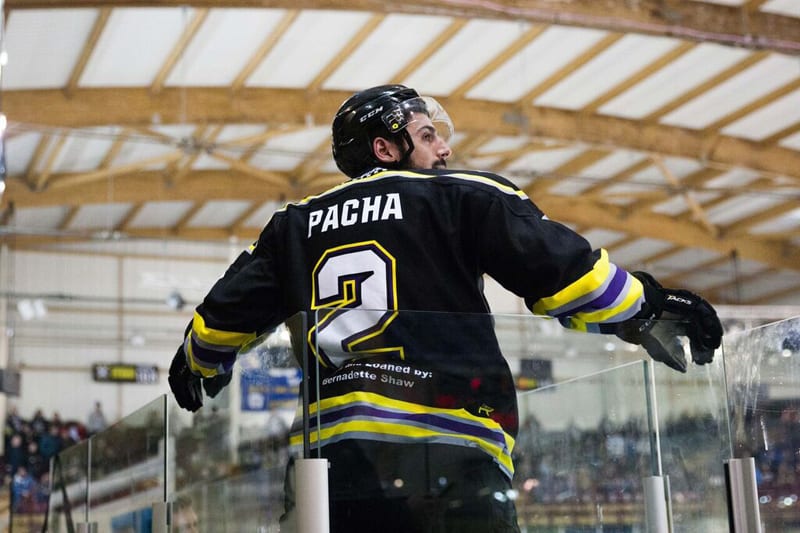
Omar Pacha spent two years as Manchester Storm’s head coach, taking them to the play-offs in his second season (PHOTO: Mark Ferriss)
“But we clicked from the start and that was important for both of us at that time.
“Putting the team together had its own challenges though. The fact I had done some recruiting for Hull helped in a way, but looking back, there are things I wish I could have done differently.
“We had some players recruited, but things had to be done quickly. I would have preferred to have done more due diligence, which is how I normally like to do it. It was a challenge, but considering nothing was ready, we made a good push in the second half of that season.”
They missed out on the play-offs in that first season so thoughts immediately turned to season two and quickly learning from the mistakes from the year before. That and having the time to do the proper background work.
It paid off for them as they clawed their way into the play-offs at the second attempt, going down to Cardiff Devils over the two legs.
Russell in particular was proud at the improvement and growth in that second season and credits one man who helped to guide him in those early days as he tried to merge Manchester Storm of old with this new incarceration.
He said: “That first year, we all made mistakes in those early stages and made the best of a very difficult situation at that time.
“I’m proud of so many things and going into that second season, we’d learned a lot of harsh lessons and knew the type of people we wanted so in terms of our recruitment, the strategy was much clearer and while the hockey CV was important, the human element was too.
“We retained guys like Paul Phillips, who was a good guy on and off the ice as well as Trevor Johnson and Eric Neilson, guys with leadership qualities and at the core of what we wanted to do who bought into the ideals we had.
“They guided us along the path and that second season, the aim was progress. We finished ninth in that first season so getting to the play-offs were the bare minimum for those expectations. From there, anything can happen.
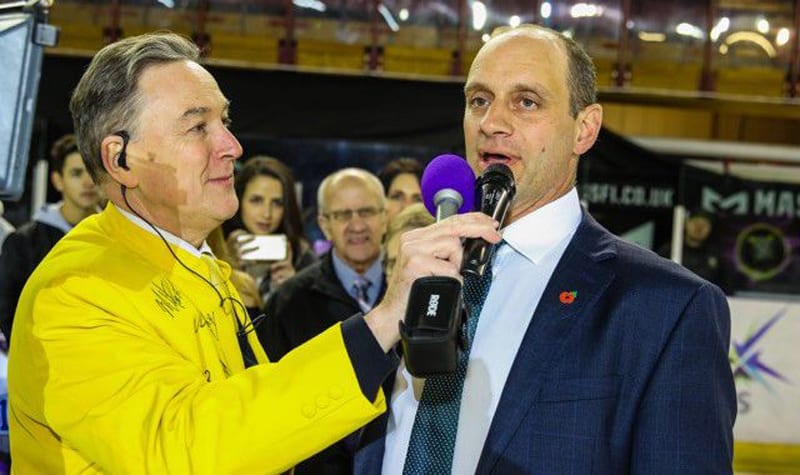
Another two faces from Manchester Storm’s past and present – announcer Jon Hammond and former player, now assistant coach Mike Morin (PHOTO: Mark Ferriss)
“Seeing the fan base evolve in those two years was also something I was hugely proud of and we played really strongly on the old Storm factor. Bringing Jon Hammond in as announcer really helped that.
“In fact, Jon was pivotal for me in those first two seasons and his help and support was phenomenal and was a great sounding board. He was really invested and the conversations I had with him were really useful.”
Omar added: “I was really happy to get the team into the play-offs in that second season. I was really happy for Neil too. We had various talks about making the play-offs and pushing the brand and help to grow it.
“I was happy for Mark too to help show him the club was growing. We maybe didn’t have the most talented team, but we had a hard working team that cared and faced a lot of injuries.
“We were a point of seventh, but we missed out and ended up playing Cardiff in the quarter finals. It was a good series, but they were the better team.”
After the second season, Manchester found themselves in the hands of new owners as businessmen Jamie Tunstall and Gordon Greig took over the club, taking Ryan Finnerty with them as the new head coach and later general manager after he left Braehead Clan.
Omar moved on and later became the new coach at Dundee Stars while a timely opportunity for Neil meant he was off to work for Manchester City as the head of hospitality sales and business development.
While he was given the assurances he would continue in the job, he admits working with Ryan, who whom he stressed he got along with very well, could have put a strain on things professionally and the move to the Premier League side arrived came at the right time.
Neil said: “When the takeover came, looking back on it, I understood it and Mark and Mike were ice people. Mark was more of an ice hockey person, but Mike was certainly an ice person.
“When Ryan, Jamie and Gordon came on board, I was unsure of what lay in store, if I’m honest. I was told my position was fine and this was made clear to me.
“But I suppose, with change – and nobody likes change – and looking back at it three years on, I looked at it as my baby. You nurture it, develop it, grow the fan base.
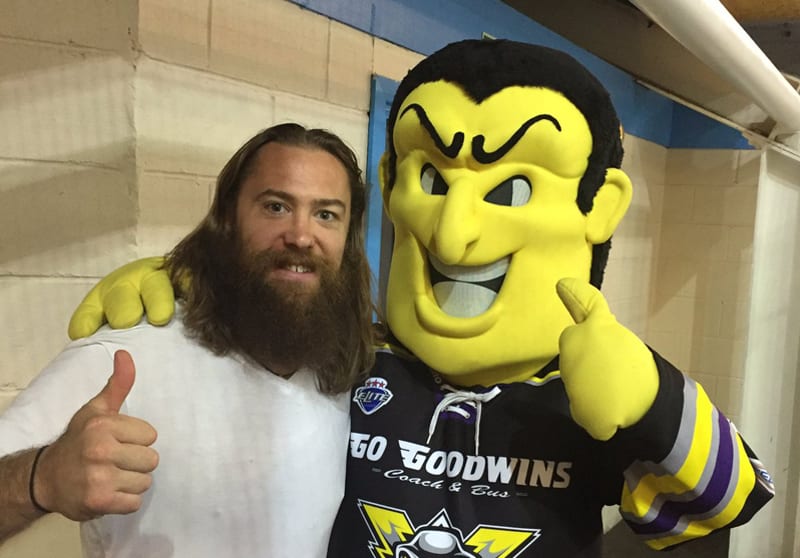
Eric Neilson, one of Storm’s more recognisable players since they returned in 2015 with club mascot, Lightning Jack (PHOTO: Manchester Storm)
“When a new ownership comes in, they will – and quite rightly – have their own thoughts and opinions on how they want to proceed.
“The call from Manchester City from my own point of view probably came at the right time. Calling a spade a spade, Ryan’s an alpha male and I’m an alpha male.
“While we have numerous things in common and he being a former ice hockey player, it’s engrained in his DNA and I think eventually those personalities would have clashed.
“I take nothing away from the excellent work Ryan and his team have done there. They’ve gone in a different direction, particularly in that first season and I still keep an eye on them, even going to the occasional game if my schedule allows.
“If it’s on a webcast, I’ll watch it. It was definitely a strange time for me, but the call from Manchester City came at the right time.”
Omar added: “It was a weird feeling when the ownership changed in 2017 because I didn’t really expect it. I was always confident of going back for a third year, but then I didn’t.
“Looking at them now, everyone is in a great position. Neil is working at one of the best sporting organisations in the world at Manchester City. The experience I gained in Manchester had really helped me when I went to Dundee.
“Ryan and his team have done really well and finished second in their first year, but it’s a tough market there because of the football, but the ethos is different to ours, in a way.
“They have their way of wanting to do things and they’re doing a job that isn’t easy, but they’re definitely doing their best.”
Finnerty had coached at Braehead and Sheffield Steelers, finishing as high as second and very much a long-serving Elite League custodian as a player and now as a coach and GM.
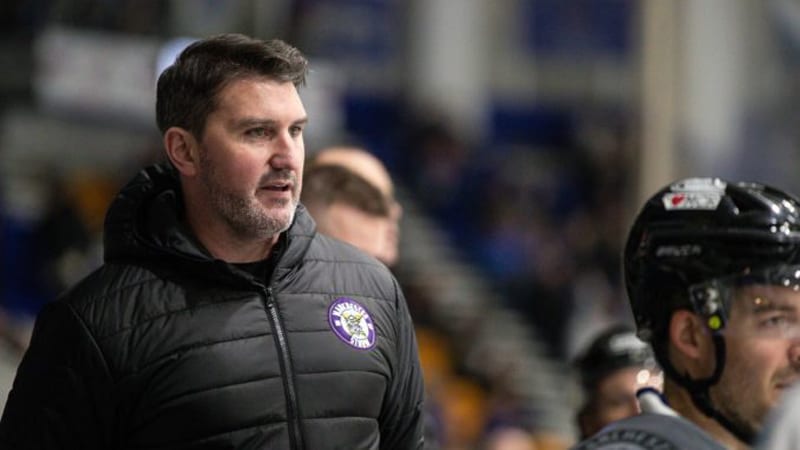
Ryan Finnerty arrived from Braehead Clan in 2017 and is the current coach and general manager (PHOTO: Scott Wiggins)
He spoke of how the opportunity to become involved with Storm came about and paid tribute to the work done before him, which he reckons making the transition much easier as he got to grips with his new challenge.
“It was a great opportunity for us,” he said. “Jamie was influential behind the scenes and I was invited along for the ride. I was able to take what I’d done with Braehead and Sheffield into Manchester and be more involved of the ownership side of things.
“It was a lot of stress and a lot of moving and I can’t believe it’s been three years already since it all happened.
“Being a GM is probably the path I’ve been on for some time and when the day comes where I can step away from the bench and take over the GM side and allow another coach to come through and take this organisation on.
“When that time comes we’ll see, but it’s definitely something I’ll look to do in the future.
“The chance to get involved came up and it was something Jamie and Gordon had dug up. They were up for sale, but were well backed by Planet Ice after only being back for a couple of years.
“The work Omar and Neil did was fantastic so we were fortunate enough to walk into a good set-up and take it from there.
“It’s been a lot of fun in the last three years and up until COVID, we really liked where the organisation was going.
“I was fortunate to bring over some of the guys we did in that first year and utilise the school packages we had at our disposal.
“We definitely benefitted from that and I had a good team in Glasgow so I was able to take some of those guys to Manchester and it bore fruit in that first season, where we finished in second place.”
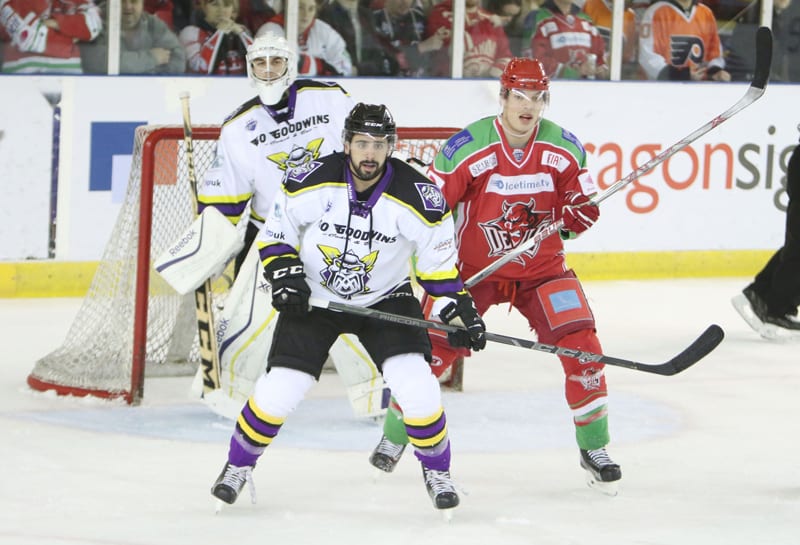
Cardiff Devils were Manchester Storm’s first Elite League opponents on this day five years ago (PHOTO: Helen Brabon)
So what of the future for Manchester Storm? At the time of writing, 2020 was gripped with the effects of coronavirus and how it affects the way we work, travel and even live.
Earlier this week, it was announced local lockdown measures have meant their Planet Ice home in Altrincham has been temporarily shut, affecting the local kids and the Academy they’ve established as a pathway for local talent.
This news was announced after speaking to Ryan about Manchester, but despite the ongoing uncertainty, he’s taken some positives along the way
He added: “This year has been difficult. Jamie’s done a good job keeping the books floating and keeping our heads above water. There’s no hiding from it. It’s an incredible challenge to be able to keep paying the bills when there’s little revenue coming in.
“It’s tough for everyone and the uncertainty of where we’ll fit into this new world. All we can do is keep trying to move forward and hope we can get back playing sooner than later.
“But it’s important we don’t get caught behind the eight-ball. We don’t want to speculate and all we can do is keep working until we get the green light or someone tells us to stop.
“There’s no book anywhere that can tell you how to react to a pandemic in business. It’s new to everyone and we’re all getting hit in the pocket.
“We’ve come up with some good ideas in staying relative during the off-season, which is something we’ll take into future years. There are positives in these dark times and hopefully we can get through this sooner rather than later.
“We’re excited for the future and want to continue to grow as well as improve on and off the ice. We know our limitations and we won’t have the spending power of other teams, but we have the ability to track good players out there.
“We live in a great city and have a good reputation, growing sponsorship and great relationships with local schools as well as a growing fanbase.
“It’s about taking those steps, no matter how big or how small and keep things moving in the right direction, but provide good entertainment for the fans.”

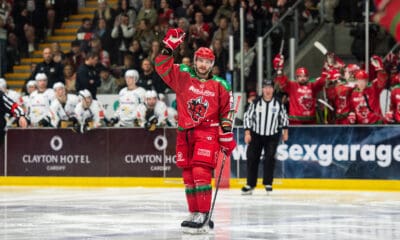



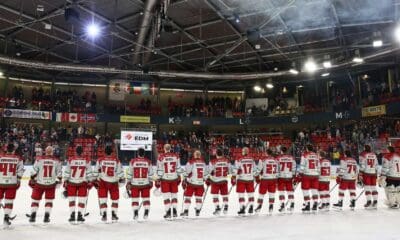

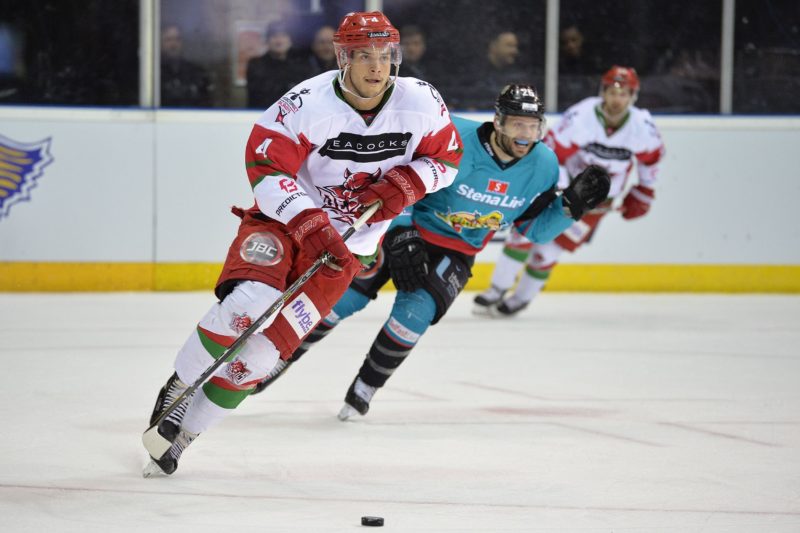
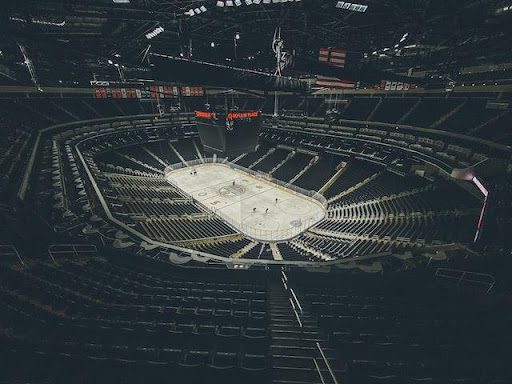
Anthony Scott
6th September 2020 at 11:36 pm
Unfortunately in my day Professional Ice Hockey was stopped in London by the Ice Shows at Wembley and Earls Court. Since then with Football becoming the major sport in the UK Ice Hockey is not financially viable. There is nothing wrong with the good amateur game.